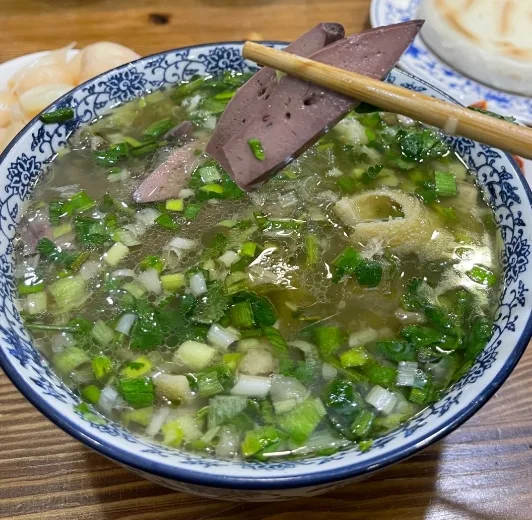Since ancient times, sesame seeds have been a beloved ingredient in Chinese culture. Whether sprinkled on pastries, pressed into fragrant oil, or used in traditional medicine, they hold a special place in people’s hearts.
Black sesame, in particular, is often hailed as a “miracle food for darkening hair” in health articles. Yet opinions on its benefits vary widely. Some praise it for “nourishing kidneys and enriching blood,” while others warn against overconsumption due to potential health risks.
So, are sesame seeds truly healthy or harmful? Which is better—black or white sesame? And which one makes a superior cooking ingredient? Let’s explore these questions in depth today.

What are the differences between black and white sesame seeds?
At first glance, the most obvious difference is their color. Essentially, they come from the same plant but belong to different varieties. Black sesame seeds retain their outer seed coat, while white sesame seeds are typically hulled.
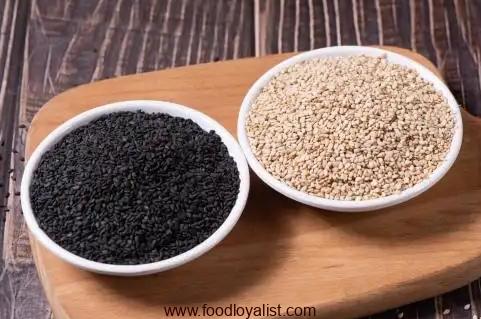
According to data from the China Food Composition Table (6th Edition)
Black sesame 100g contain:
Protein: 19.1g
Fat: 48.2g
Calcium: 780mg
Iron: 14.9mg
Dietary fiber: 14.0g
I
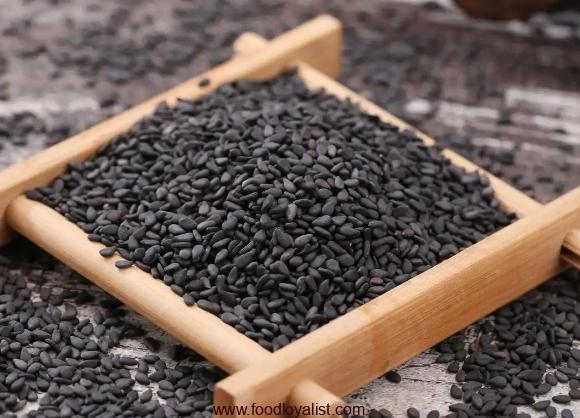
White sesame 100g contain:
Protein: 21.9g
Fat: 53.6g
Calcium: 60mg
Iron: 6.1mg
Dietary fiber: 11.8g
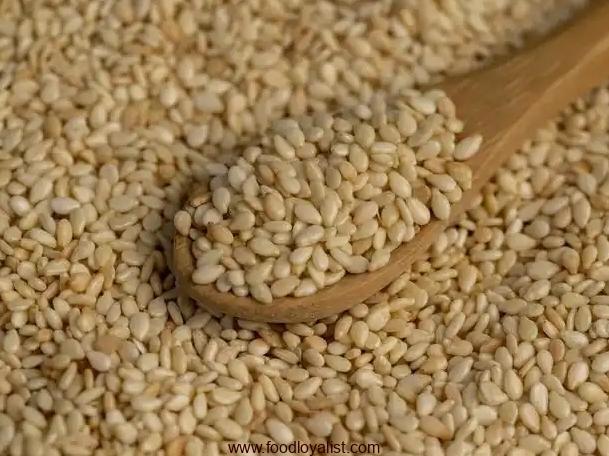
Black sesame packs more calcium and iron than white sesame, though white sesame is slightly higher in fat.
Black sesame is richer in calcium and iron, while white sesame tastes more fragrant and works better for making sesame oil or food toppings.
Can eating sesame really darken hair?
People have believed for centuries that black sesame can turn white hair black. But is this actually true?

What does scientific research say?
Research from China Agricultural University indicates that black sesame’s high vitamin E and antioxidant content benefit scalp health. However, no conclusive evidence proves its efficacy in reversing graying hair, which is primarily influenced by genetics, aging, and nutrition. The bioactive compounds sesamin and sesamol in black sesame may indirectly support hair health by boosting antioxidant defenses and reducing follicular oxidative stress.
The health benefits of sesame seeds
Cardiovascular Protection
Both black and white sesame seeds are rich in unsaturated fatty acids, particularly oleic acid and linoleic acid. These compounds help reduce low-density lipoprotein cholesterol (LDL-C) while increasing high-density lipoprotein cholesterol (HDL-C), thereby preventing atherosclerosis and cardiovascular diseases. A 2019 study published in the Journal of Nutrition demonstrated that regular sesame consumption significantly improves lipid profiles and reduces cardiovascular risk.
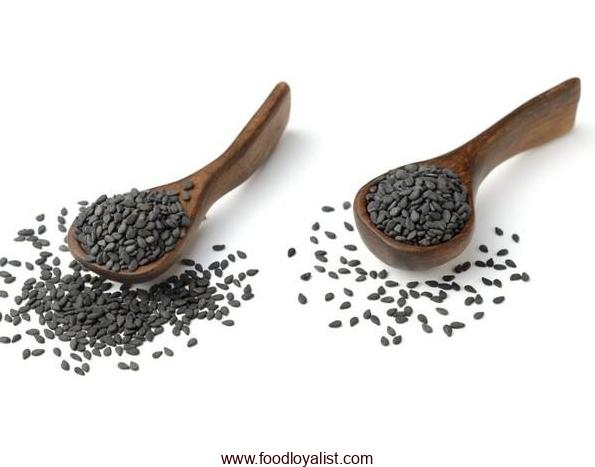
Bone Health Enhancement
Black sesame seeds contain remarkably high calcium levels – 780mg per 100g, surpassing that of milk (104mg per 100ml). This makes them an excellent supplementary calcium source for vulnerable populations including seniors, pregnant women, and children. However, calcium bioavailability from sesame is lower than from dairy. Combining sesame with vitamin D-rich foods like eggs and fish enhances calcium absorption.
Blood Glucose Regulation
Sesame’s dietary fiber content helps moderate postprandial glucose spikes, benefiting diabetic patients. The compound sesamin has shown insulin-sensitizing properties. A 2020 Diabetes Research and Clinical Practice study revealed sesamin’s mechanism in improving glycemic control through insulin pathway modulation.
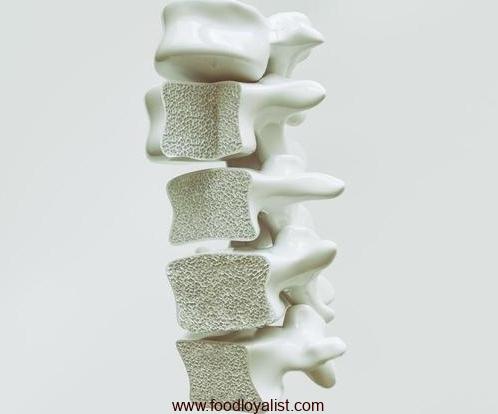
Digestive Benefits
The synergistic effect of dietary fiber (14g/100g in black sesame) and healthy oils in both varieties promotes gastrointestinal motility, effectively alleviating constipation – particularly beneficial for sedentary individuals and the elderly.
Possible health risks associated with eating sesame seeds
High Caloric Density and Weight Gain Risk
Sesame seeds contain significant fat content, providing over 500 kilocalories per 100g – equivalent to two standard bowls of rice. Excessive consumption may lead to caloric surplus and subsequent weight management challenges.
Recommendation: Limit intake to ≤15g daily (approximately one tablespoon), particularly for weight-conscious individuals.

Gastrointestinal Considerations
The substantial dietary fiber content (14g/100g in black sesame) may cause digestive distress – including bloating and indigestion – in individuals with compromised digestive function (e.g., spleen-stomach deficiency in TCM).
Recommendation: Those with sensitive digestion should consume toasted, ground sesame or combine it with warm foods to minimize gastrointestinal irritation.
Allergenic Potential
As a recognized major food allergen, sesame may trigger hypersensitivity reactions ranging from cutaneous manifestations (urticaria, pruritus) to systemic responses (respiratory distress).
Recommendation: Allergy-prone individuals should exercise caution with initial exposure and discontinue use immediately if adverse reactions occur, seeking prompt medical evaluation.
Which is more worth eating, black sesame or white sesame?
Black Sesame:
Traditional Chinese medicine believes that it can “nourish the kidney with black hair” and is often used in black sesame paste and Tonic Diet.
Used as a decoration for rice and desserts in Japanese and Korean cuisine.

White Sesame:
Chinese cold dishes (such as mouth watering chicken), braised dishes, and Western style bread surface decoration.
Used in the Middle East to make sesame paste (Tahini).
Overall, both have their own advantages and can be appropriately combined in daily diet.

Summary and Suggestions
Black sesame and white sesame have different nutrients and advantages, and a reasonable combination is better.
Moderate consumption of sesame seeds is beneficial for cardiovascular health, bone health, blood sugar regulation, and other aspects.
The intake should be controlled, and it is recommended not to exceed 15 grams per day to avoid consuming too many calories.
People with indigestion or allergies should consume with caution and choose sesame paste or sesame powder.
Although there is no scientific consensus on the effect of black hair, the antioxidant components of sesame are beneficial for scalp health.
Although sesame seeds are small, their knowledge is vast. Only by consuming it scientifically and reasonably can its health benefits be truly realized.


